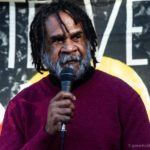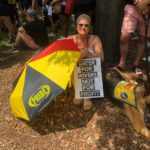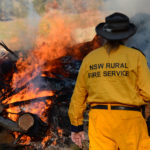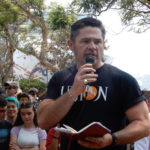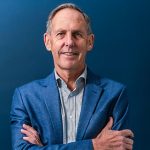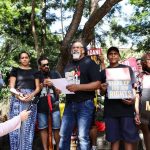“First Nations People Are Bearing the Brunt”: An Interview With Water Activist Bruce Shillingsworth
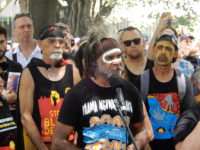
Unprecedented is a word that many have applied to the weather conditions this continent has faced over the 2019-20 summer season. It’s been used to refer to the high temperatures. It’s described the scope of the water crisis along the Murray-Darling. And then, of course, there’s the bushfires.
Many Australians who were still sceptical about changing climate lost their doubts as they witnessed the country burn in a manner not seen before. However, the voices of First Nations people – who have been facing the worst of these crises – haven’t been heard.
First Nations peoples have been the custodians of the land and its waterways for tens of thousands of years. Whereas, Europeans have only been here for a couple of hundred years and in that time, there have been extreme changes to the environment.
Muruwari and Budjiti man Bruce Shillingsworth recently addressed the crowd at the People’s Climate Assembly rally out the front of Parliament House in Canberra. And the water activist made clear that “First Nations people are bearing the brunt of what’s happening to our environment”.
A system in crisis
Shillingsworth explains that around two-thirds of Aboriginal people living in NSW do so along the Murray-Darling river system. And recent years have seen this system completely dry up in the north west of the state, which hasn’t been seen before in living memory.
An unprecedented drought is how it’s been described. However, those out there on the land tell a different story. And while this does involve a lack of rain, it also includes a number of human caused factors that exacerbate this, such as water mismanagement, theft, privatisation and speculation.
The Australia Institute outlined in December that flood plain harvesting – or water hoarding – continues to take place in the Northern Basin in an “unmeasured and unregulated” manner. And a new licensing scheme is set to increase the sustainable diversion limit.
This harvested water is being diverted into private dams. The institute has further documented that around 20 to 30 taxpayer-funded dams have recently been constructed along the Murray-Darling, which do nothing to “help drought-stricken towns, struggling small irrigators or the wider public”.
When the River Runs Dry
The When the River Runs Dry documentary is to screen around the nation. It’s an “Australian-made exploration of the rules governing the Murray-Darling Basin and how they are destroying the environment causing extinction-level events, and displacing communities”.
Mr Shillingsworth features prominently in the documentary. He also launched the Waters for Rivers campaign in 2019, before going on to lead the Yaama Ngunna Baaka Corroboree Festival Bus Tour in north west NSW last September.
Sydney Criminal Lawyers spoke to Bruce Shillingsworth about the devastating effect multiple crises are having upon First Nations communities and how Indigenous knowledge needs to play a prominent role going forward.
Firstly, you addressed the crowd at the People’s Climate Assembly in Canberra last week, and you mentioned that Aboriginal communities living along the Murray-Darling are being hit hardest by the destruction of the river system.
Bruce, how are the First Nations communities that have been living along the river system for tens of thousands of years coping?
There’s a bit of water coming down the rivers as we speak. It’s gone to Walgett. It’s getting to Brewarrina, and it will probably go down to Wilcannia.
Over the last couple of years, a lot of our communities have been suffering because there was no water in the river. And the changes in the land are affecting our people. The clearing of the land. The damming of our waters. The rivers are not flowing.
We’re not seeing that natural environment anymore. That natural weather where we used to get rain every now and again. And we used to get floods four or five times a year. That’s not happening.
So, what happens is it starts to affect the food sources for our communities. We go to the river to catch our fish. The water brings life to the plants – the bush tucker, the food. But, it’s not happening.
Our diets have changed. There are sicknesses our people are suffering from, because of the food they eat. There’s diabetes and high blood pressure.
And it affects social life. A lot of our people have mental health issues now. A lot of them are stressed. A lot have heart disease or kidney disease. This has affected our communities a lot.
It affects the way we do things. And the passing down of our knowledge. Our dream time stories, which are connected to our land, have become disconnected.
You’ve recently been to the NSW north western town of Brewarrina, which is one of those that’s been suffering most during the water crisis of the last few years. What was it like out there?
I was out there during the Christmas and New Year break. I spent about five or six weeks there. We had problems with the water.
The water was unsuitable to drink. So, we had to try and get a community filter put in. And before our people could get clean drinking water, they were drinking stagnant water from out of the ponds – out of the waterholes.
A couple of weeks ago, we had the fish kills in Brewarrina. So, the fish were dying.
It was drastic. Our people are living in a terrible situation, because there are no government services in our communities. The government doesn’t help or support those communities in what they want to do.
So, I felt very angry. I was disappointed at the services in our communities. And with the government for not looking after our community, because they’re responsible for protecting and looking after them.
There’s a lot of talk about water hoarding, private dams and water speculation playing a large part in the water shortage crisis in NSW. How do you explain what’s going on with the water when it comes to people trying to make a profit from it?
If you look at the Murray-Darling, it actually runs through four states. It comes down from Queensland, through NSW, down Victoria, then straight out to South Australia.
So, the big problem is that up the top end of the river system, we’ve got the waters and the dams. And in the middle in NSW, the Darling has got no water. But, if we look in the Murray, there’s water in it, so there’s something wrong.
If we look up north, there’s the big damming, which is owned by overseas companies. They’re damming the water and not releasing it.
So, what are they using this water for? They’re using it for the big cotton farms and big agriculture. So, the big pumps have taken most of the water, which is contributing to the drying up of our rivers here in NSW.
We last spoke about the water crisis in October. Since then the country has been stricken by an unprecedented bushfire crisis. What are some of the long-term impacts the recent fires are going to have?
Well, if you look at a lot of the environment, especially the wildlife, it’s been destroyed. A lot of the wildlife and the environment have been.
The natural plants that are traditionally used by First Nations people have all been burnt and destroyed. So, where do we get our food from?
That’s our natural food from the natural environment. So, that’s how our people are suffering. And the connection to our land and our spirits has been destroyed as well.
That’s going to take generations to grow back. And here, on the other end we’ve got the drought. Then we’ve got the manmade destructions and the bushfires.
So, First Nations people are bearing the brunt. They suffer more because they are people of the land. They are protectors of the land. They have lived on the land for thousands of years. And once the land is destroyed, it destroys our lives and our communities.
As the bushfire catastrophe unfolded a lot of Australians changed their opinions regarding changing climate, however the Morrison government hasn’t.
The PM recently said he won’t be bullied into taking action on climate by inner city people, while some National MPs are calling for more coal mines.
What do you think about the way the government has reacted to what are now multiple environmental crises this country is facing?
First Nations people are disappointed, because there was no consultation or speaking about the suffering of the people or the land. There has been no consultation with First Nations people. No support. No services for those on the ground.
So, First Nations people need to start voicing our opinion. We’re starting to. For so long, the First Nations voice hasn’t been heard. The First Nations are trying to push their agenda and tell the government what’s happening. But, the government’s not listening at the moment.
First Nations people are calling for an investigation – a royal commission – into the destruction of the waterways, the rivers and the land. That’s the way we’ve got to do it.
The only way to do it is to get them in the courts. And that court is not here in Australia. We’ve got to take them to the international courts to make them accountable.
And if you look at the papers recently, a lot of the MPs are involved in scandals and the corruption that’s going on with the rivers and the bushfires.
You’ve touched on it a bit there, but from your perspective, what should be happening?
We need to get a big shift in the way people do things. First of all, we need First Nations peoples’ voice to be heard. And we need First Nations people to be able to contribute with their knowledge and a lot of what they’ve been doing on the land for thousands of years.
First Nations knowledge and people need to be recognised. And that means working with First Nations people on the land and trying to fix the environment and put it back to the way it was.
We keep upsetting our natural bounds – our natural cycles on the land. We need to fix that. The only way we can do that is work together with government, non-Indigenous people and First Nations people.
First, we need a royal commission to investigate it, because there’s lots of corruption going on. We need to make these people accountable.
And then we’ll start fixing the problems by sitting down, talking about real ways of fixing things and strategising – just getting together with people on the land.
And lastly, Bruce, you’ve been out there spreading the word of the Water for Rivers campaign. What’s next on the horizon? How’s the campaign going to develop from here?
We’ve got to keep campaigning. We’ve got a couple of these events and a couple of speakers. We’ll be talking on the radio. The media is now interested.
We’ve got a documentary that’s about to be released on the 22 February. It’s called When the River Run Dry. That will be screening across Australia, so we’ll get that information out there.
A lot of people in the city are getting out there. We’re doing protest rallies. We’re getting that information out to government. Telling MPs to get on board – this is what we need to do.
So, there’s a lot of energy around climate change, getting water into our rivers, about the bushfires. So, it’s happening slowly, and it’s building.


